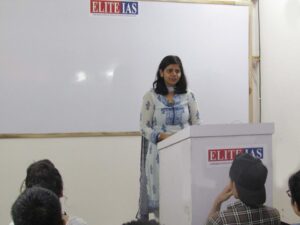
As someone who hails from a small village in South India, becoming an IAS officer seemed like a far-off dream. The aspiration was not just my own, but the collective dream of my village, my family, and my mentors. The lack of resources and exposure was a constant obstacle; however, UPSC Online Coaching served as a silver lining, opening up a new world of possibilities for aspirants like me, irrespective of our geographical locations.
Initial Hesitation
I remember the initial sense of skepticism I felt when considering the option of online coaching. In my village, traditional methods of education are not just respected – they are revered. Classroom teaching is considered the most effective way to gain knowledge, and the idea of technology playing a significant role in academic preparation, especially for something as demanding as the UPSC exam, was met with skepticism and doubt.
There was also a sense of anxiety within my community, which has always been cautious when it comes to adopting new technologies. People wondered how a computer screen could possibly replace the wisdom imparted by a human teacher in a physical classroom. There was a fear that online coaching might be another modern fad that promises much but delivers little.
However, two major factors compelled me to consider this unconventional route seriously. First, the harsh reality of economic constraints. The cost of relocating to a city for coaching, coupled with the high fees of traditional coaching centers, was an enormous financial burden that neither my family nor I could bear.
Second, and perhaps more importantly, was my unwavering desire to bring about change without severing my roots. I didn’t want to turn my back on the very community I aimed to uplift through my career in civil service. My aspiration was not just to climb up the social and professional ladder, but also to pull my community up with me. This burning desire outweighed my initial hesitations and skepticism, leading me to explore alternative avenues for my UPSC preparation. That’s when I stumbled upon the vast, resourceful, yet initially intimidating, world of online coaching.
My Decision to Enroll
My exploration for alternative modes of preparation led me to discover a variety of Sociology online classes designed exclusively for UPSC aspirants. At first, the prospect of studying Sociology – an optional subject for the IAS examination – through an online platform was both compelling and relieving. Traditional classroom sessions indeed have a unique aura; the direct interaction with teachers and the instant clarification of doubts can be incredibly reassuring.
However, the physical infrastructure of such classes often comes with its own set of challenges. Besides the hefty fees, the requirement to relocate or commute long distances meant investing a lot of time and emotional energy. These were resources I couldn’t afford to divert from my actual study time. The online platform promised flexibility and accessibility, but could it match the effectiveness of a physical classroom?
To address my reservations, I took the initiative to communicate with other aspirants who were already enrolled in online Sociology courses. I searched forums, read reviews, and even participated in free introductory webinars. The feedback was overwhelmingly positive, highlighting features like expert faculties, comprehensive study materials, and timely evaluations. Feeling convinced and seeing the clear benefits, I took the plunge and enrolled in an online Sociology course.
This decision brought about a significant shift in my UPSC preparation strategy. The online course not only made high-quality educational resources accessible to me but also offered the emotional advantage of staying close to my family. I could now strike a perfect balance between rigorous academic preparation and spending invaluable time with my loved ones, who have always been my support system and emotional backbone.
Why Online Coaching Worked For Me
The key ingredient to my successful online coaching experience was undoubtedly the Test Series for UPSC. In a conventional classroom setting, test series are typically conducted once a week or sometimes less frequently. However, the online platform provided me with the liberty to take these tests as per my convenience, allowing me to fit them around my busy rural life and farming responsibilities.
These weren’t just any mock exams; they were meticulously designed to simulate the actual UPSC examination conditions, complete with time restrictions and the exact pattern of questions. This made for a rigorous testing environment that was instantly accessible, right within the four walls of my home. The GS test series and essay test series played a vital role in familiarizing me with the format of the UPSC exam, thus reducing the unknowns and consequently, my anxiety.
What set these test series apart were the detailed analyses that followed. Upon completion of each test, I received comprehensive feedback, which included not only my score but also my strengths, weaknesses, and areas for improvement. This valuable information enabled me to pinpoint the gaps in my preparation and to strategize accordingly.
Additionally, attempting these tests also brought another benefit – it dramatically improved my time-management skills. I learned to allocate specific amounts of time to different sections, helping me complete the exams more efficiently. Moreover, the constant cycle of taking tests and receiving feedback built up my psychological stamina, preparing me mentally for the stress and pressure of the actual UPSC examination day.
Community and Networking
One of the most enriching aspects of online IAS coaching was the networking opportunities it offered with a broader community of UPSC aspirants. When you’re from a small village, your exposure to diverse perspectives is often limited. However, the online platform shattered this limitation. I found myself in a virtual classroom filled with individuals from various states, cultures, and educational backgrounds.
This diversity was not just geographical but also intellectual. I was pleasantly surprised to find out that students were not merely focused on sharing study materials or solving academic doubts; they were equally keen on discussing the latest developments in national and international affairs, dissecting complex socio-political issues, and debating possible solutions.
The sense of community that was fostered through these interactions was genuinely priceless. Group discussions and peer-to-peer sessions became regular features, and they enriched my understanding of the subjects beyond the conventional curriculum. We would share notes, circulate useful articles, and even create forums where complex doubts were clarified not just by one individual but through collective brainstorming.
This was something I had never experienced before, and it added an unexpected but invaluable dimension to my UPSC preparation. The process wasn’t just about individual growth; it was about collective learning. It felt like we were all in this journey together, helping each other climb a mountain where the top had room for everyone who aimed high.
Financial Feasibility
The financial aspect of UPSC preparation is often a significant burden for aspirants, especially those hailing from less privileged backgrounds like mine. Traditional coaching institutes typically demand a high enrollment fee, which sometimes does not even include the cost of additional study materials, practice tests, or special lectures. Adding to this financial burden are other costs like travel and, potentially, relocation to another city where these coaching centers are located.
All these expenses stack up, making the dream of joining civil services seem financially unattainable for many. For someone like me, who comes from a modest farming family, these costs were not just prohibitive; they were outright impossible to meet.
This is where online coaching proved to be a financial lifesaver. Not only were the course fees more affordable or low, but the platform also often included study materials, test series, and expert lectures as part of the package. This cost-effectiveness allowed me to allocate funds for additional learning resources.
With the money saved, I was able to invest in essential books, subscribe to reputed newspapers for current affairs, and even access specialized journals online that further strengthened my preparation. It wasn’t just about saving money; it was about using the saved resources to create a more comprehensive and rounded educational experience that would stand me in good stead come the UPSC examination.
Personalized Guidance
One of the most incredible aspects of my online coaching experience was the personalized guidance I received from the teaching faculty. Initially, I was concerned that an online platform might lack the personal touch that comes from face-to-face interaction with teachers in a conventional classroom. I wondered if it would be possible for instructors to provide individualized attention to each student when teaching in a digital format.
My concerns were put to rest soon after I enrolled. Despite the virtual nature of the classes, the educators were remarkably adept at creating an individualized learning experience. They utilized features such as one-on-one video consultations, personalized emails, and even discussion forums where they would respond to queries in a manner that felt tailored to each student’s needs.
The impact of this personalized mentorship on my preparation strategy was nothing short of transformative. The teachers were not just imparting knowledge; they were true mentors. Their experience in the field allowed them to provide unique insights into the UPSC exam pattern, question types, and critical areas of focus. They helped me identify my strong and weak points, advising me on how to allocate my study time effectively.
The constructive feedback I received after each sectional tests or assignment was in-depth, highlighting not just what I got wrong, but also why I got it wrong and how I could correct it. These detailed critiques enabled me to refine my approach continually, providing me with a sense of direction that would have been hard to find in a self-study scenario or even in a large, impersonal traditional classroom.
Finally to conclude, I would like to say that I am, standing on the threshold of a new chapter in my life. Looking back, I owe much of my success to online coaching, which leveled the playing field for me. Online coaching has proven to be an effective, accessible, and comprehensive method of preparation, demonstrating that dreams are bound by will, not by geography.
Therefore, if you are hesitating to take the first step due to constraints of location or resources, know that online platforms are waiting to be explored. They could be the stepping stone that converts your lofty aspirations into achievable goals, as they did for me.
This story stands as evidence that when you marry your hard work and aspirations with the right resources, dreams are achievable, no matter where you come from. With technological advancements democratizing education, quality UPSC preparation is no longer a privilege reserved for the few but a possibility for the many. At Elite IAS Academy, be online or offline, we make our best efforts to make your Dream come True!





